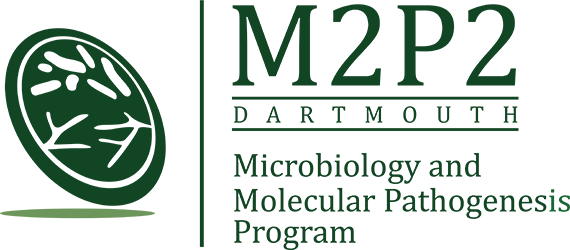M2P2 and the research community is highly interactive. Many research projects and mentoring interactions cut across labs, departments and schools. Research centers and cores also nucleate interactions.
Departments & Schools

The M2P2 community spans multiple departments including Microbiology and Immunology, Biochemistry and Cell Biology, Molecular and Systems Biology, Biological Sciences, Chemistry, the Department of Medicine at Dartmouth Health, and the Thayer School of Engineering.
All of these departments host seminar series that frequently bring in speakers of interest to the M2P2 community. To be added to the M2P2 seminar announcement list, contact Karen Thompson.
Guarini School of Graduate & Advanced Studies

The Guarini School of Graduate and Advanced Studies provides 1) career and professional development for graduate students and post-docs, 2) advocates on their behalf, 3) provides resources for travel, health and wellness support, and 4) space for graduate student activities.
Guarini oversees a variety of programs that M2P2 students participate in including:
Research Centers & Programs
DartCF
Cystic fibrosis (CF) is a genetic disease that leads to airway infections, CF-related diabetes, digestive complications, and inflammatory responses. While therapeutic advances have extended lifespans and improved quality of life, but patients still suffer from CF symptoms. Our comprehensive Dartmouth Cystic Fibrosis Research Center (DartCF) aims to catalyze new directions in CF basic and translational research at Dartmouth, develop integrative strategies to address CF pathobiology, develop new research tools and support CF research through shared services, and build research tools and resources to support CF research worldwide. CF research in M2P2 labs is aided by close collaborations with clinicians who provide important insights as well as clinical samples through the Translational Research Core.
Dartmouth Cancer Center
The Dartmouth Cancer Center is a collaborative effort between the Geisel School of Medicine and Dartmouth Health, a large, tertiary care teaching hospital in close proximity to Dartmouth, and it supports many research efforts in Cancer Signaling, Genomes, and Networks (Cancer SiGNs),Cancer Population Science, Immunology & Cancer Immunotherapy, and Translational Engineering in Cancer. The Dartmouth Cancer Center research fosters a collaborative environment that promotes the incorporation of molecular and cellular biology, imaging, radiobiology, biophysics, and engineering approaches into the development and evaluation of new cancer mechanisms, diagnostics and treatment strategies.
Immunology Program
The M2P2 program is highly complementary to the Immunology Program-both programs have a goal of understand how the host and microbes interact in ways that bring about health and disease. The Immunology Program sponsors a weekly Immunology Journal Club, a weekly pizza and data club, a Program retreat, and classes. Many M2P2 students participate in aspects of the Immunology Program and collaborations between microbiologists and immunologists can significantly advance our understanding of host-microbe interactions.
BioMT
BioMT is an NIH-COBRE funded program aimed at supporting the development of therapeutic targets that are identified in Dartmouth research. Areas of interest include phosphorylation, protein-protein interaction networks, conformational switches, microRNA regulatory pathways, and intracellular trafficking and degradation machineries, immunotherapy in cancer, antimicrobial strategies, and vaccine development. BioMT also supports programming to aid in the mentoring of students, post-docs, and junior faculty members. BioMT supports projects in protein biochemistry and engineering, biophysics, high-resolution microscopy, and chemical, structural and computational biology.
Diversity & Inclusion
We are committed to creating an inclusive environment that welcomes diversity in many aspects, including race, ethnicity, national origin, gender, gender identity, gender expression, sexual orientation, age, disability, socio-economic status, and religion and cultural views. We aim to cultivate a culture that values and rewards excellence in research and mentorship, and that recognizes that a diverse community will make our science and our impact on society more powerful.
As part of these efforts, we will continue to train Dartmouth’s mentors and mentees how to have highly productive mentor-mentee relationships. The Guarini School for Graduate and Advanced Studies Diversity Office oversees programs that support service members and veterans, LBGTIQA+, first-generation students, women in STEM, and students with disabilities. The Title IX office oversees issues relating to pregnant and parenting students, sex-based harassment, and is a clearinghouse for Dartmouth’s programs for promoting sexual respect.
Dartmouth’s Office of Institutional Diversity and Equity manages equal opportunity & affirmative action, disability resources for faculty and staff, and training and educational programs in excellence and leadership.

